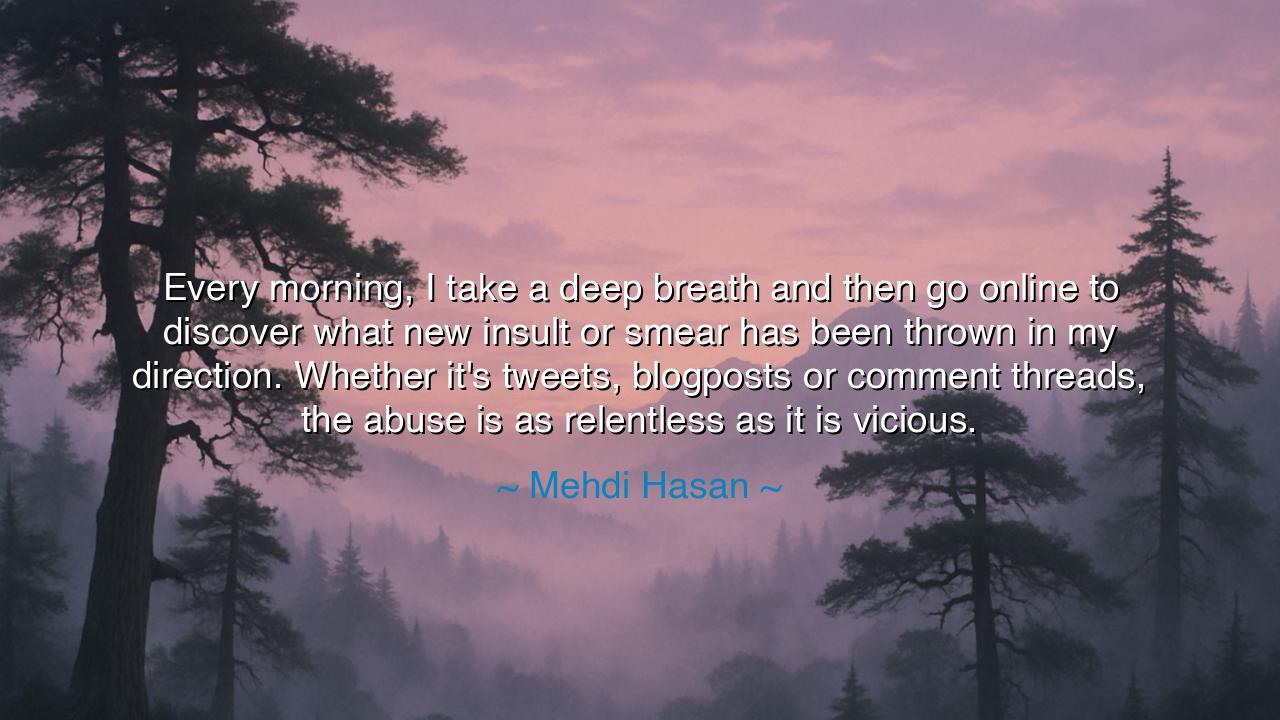
Every morning, I take a deep breath and then go online to
Every morning, I take a deep breath and then go online to discover what new insult or smear has been thrown in my direction. Whether it's tweets, blogposts or comment threads, the abuse is as relentless as it is vicious.






"Every morning, I take a deep breath and then go online to discover what new insult or smear has been thrown in my direction. Whether it's tweets, blogposts or comment threads, the abuse is as relentless as it is vicious." These words by Mehdi Hasan reflect the brutal reality of living in a digital age where criticism, abuse, and online harassment are an ever-present, often overwhelming force. His reflection speaks to the emotional toll and mental burden of navigating an online landscape where voices, both constructive and destructive, clash violently. The modern experience of waking up to a flood of negativity is, in a way, a reflection of the ancient trials endured by those who were subject to public scorn or condemnation, yet now amplified by the power of digital platforms.
In the ancient world, public shaming and verbal assault were tools of power used by rulers and enemies alike. The Athenians, for example, often engaged in the practice of ostracism, where individuals who were seen as a threat or threat to the public good were exiled. This act of banishment was as much about reputation as it was about power. Those who were ostracized experienced not only the physical separation from their homes and families but the emotional toll of being socially rejected. Similarly, in the world of Rome, Cicero, the great orator and politician, faced abusive rhetoric and insults from his political enemies. These public attacks on his character were meant to undermine his influence and reputation, just as the modern-day online abuse seeks to tear down individuals by attacking their very essence, their character.
Consider the case of Socrates, the great philosopher of Athens. His commitment to truth and his habit of challenging the status quo led him to face constant criticism and ridicule. In fact, he was tried and condemned to death, in part because of the smear campaigns directed against him by those who feared his influence. Socrates was not only punished for his ideas but for the public outcry that followed, the very insults and accusations hurled at him by his detractors. Socrates’ stoic resolve in the face of such attacks reminds us that, throughout history, individuals have faced public derision and scorn, often at great personal cost, but with a sense of purpose and conviction that transcended the pain of the moment.
In modern times, we see the digital age providing a similar outlet for the hatred and negativity that once existed in more public forms. Hasan’s words speak to the new reality of the internet—a place where people can be attacked anonymously, and where the line between criticism and abuse is often blurred. Social media has become a platform where the relentless nature of online abuse takes on new dimensions, with people now able to bombard public figures and private citizens alike with a constant flow of vitriol. Hasan’s reflection brings into sharp focus the way in which technology has shifted the nature of public discourse from a more controlled, mediated environment to one where cruelty and insults can be dispersed far and wide with ease.
This shift has deep roots in the ancient world, where public speech had the power to elevate or destroy. Aristotle, in his Rhetoric, understood that words were not just tools of persuasion, but could be wielded to slander and destroy the reputations of others. In his teachings, he emphasized the moral responsibility of the speaker, knowing that words, once spoken, could have lasting effects, for both the speaker and the recipient. The same principle applies to the world of modern communication—whether in politics, entertainment, or personal life, the power of words to harm is immense. Hasan’s daily ritual of confronting such abuse speaks to a deeper struggle: the battle between truth and destruction in the digital space.
The lesson to be taken from Hasan’s experience is not just about suffering under the weight of online abuse, but about how we can respond to it with strength and resilience. The ancients knew that personal integrity could withstand the harshest of criticisms if one remained true to their values. Socrates, faced with the ultimate punishment of death, chose to stand by his beliefs rather than compromise to silence his detractors. His resolve and focus on truth helped him endure. Similarly, in the face of online abuse, we must find ways to hold firm in our own truth and integrity, refusing to allow the digital mob to define our worth.
As we move through a world increasingly shaped by digital interactions, the lesson is to take control of the narrative. We may not be able to prevent the insults or the smears, but we can choose how we respond. Resilience, self-worth, and clarity of purpose are tools that can shield us from the toxicity of the online world. Just as Aristotle encouraged the careful use of language to foster righteousness, we must also use our words, both online and offline, to build community, spread understanding, and resist the temptation to engage in hate. In this way, we can shift the balance of discourse, turning the tide of online abuse into an opportunity for compassion and respect.






AAdministratorAdministrator
Welcome, honored guests. Please leave a comment, we will respond soon